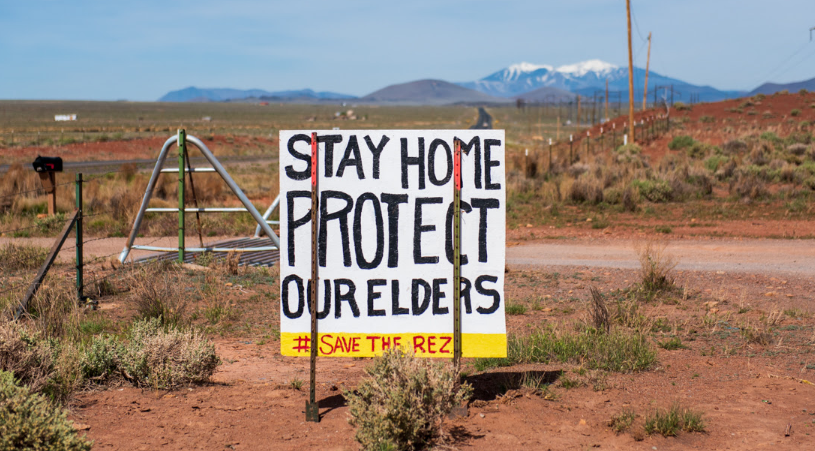
- Details
- By Native News Online Staff
WINDOW ROCK, Ariz. — On Tuesday, the Navajo Department of Health, in coordination with the Navajo Epidemiology Center and the Navajo Area Indian Health Service, reported 159 new COVID-19 positive cases for the Navajo Nation and six more deaths. The total number of deaths is now 688 as of Tuesday. Reports indicate that 10,075 individuals have recovered from COVID-19, and 175,072 COVID-19 tests have been administered. The total number of positive COVID-19 cases is now 18,324, including two delayed reported cases.
Navajo Nation COVID-19 positive cases by Service Unit:
- Chinle Service Unit: 3,630
- Crownpoint Service Unit: 1,980
- Ft. Defiance Service Unit: 1,890
- Gallup Service Unit: 3,041
- Kayenta Service Unit: 1,868
- Shiprock Service Unit: 2,923
- Tuba City Service Unit: 1,873
- Winslow Service Unit: 1,098
* 21 residences with COVID-19 positive cases are not specific enough to place them accurately in a Service Unit.
On Tuesday, the state of Utah reported 2,333 cases and Arizona reported an all-time high of 12,314 new cases. The state of New Mexico did not report its daily numbers due to a temporary system outage with their reporting system, according to the state’s Department of Health.
Navajo Area Indian Health Service reported on Tuesday that floor bed occupancy is over 80-percent and Intensive Care Units are not at capacity, but that is due to the expansion of ICU beds to accommodate patients. The status of ICU capacity continuously changes and continues to be monitored by IHS officials.
“Our health care system is still in a state of crisis. We have to do everything we can to bring down the number of new COVID-19 cases and we can do that by staying home, avoiding travel, and staying away from large crowds and gatherings. We cannot lose hope and we cannot become complacent. Let’s think of our health care workers and their families. They are risking their health and their lives to fight for us, so let’s pray for them and help them by staying home. We are hopeful that a safe vaccine will soon be approved by federal officials. Please stay home, wear a mask, avoid crowds, practice social distancing, and wash your hands often,” said Navajo Nation President Jonathan Nez..
Navajo Department of Health continues to offer free testing sites for COVID-19 during the month of December, from 9:00 a.m. to 4:00 p.m. (MST) on the following days and locations:
Mondays: Kayenta Chapter and Tuba City Chapter
Tuesdays: Chinle Chapter
Wednesdays: Dilkon Chapter and St. Michaels Chapter
Thursdays: Crownpoint Chapter and Shiprock Chapter
For more information, including helpful prevention tips, and resources to help stop the spread of COVID-19, visit the Navajo Department of Health's COVID-19 website: https://www.google.com/url?q=http://www.ndoh.navajo-nsn.gov/COVID-19&source=gmail&ust=1607559627803000&usg=AFQjCNHpa9mObrA-GBpMiYIwBtgDKXsLdg">http://www.ndoh.navajo-nsn.gov/COVID-19. For COVID-19 related questions and information, call (928) 871-7014.
More Stories Like This
Native News Weekly (August 25, 2024): D.C. BriefsNavajo Nation Mourns the Passing of Former Vice President Rex Lee Jim
Deb Haaland Earns Endorsement From Communications Workers of America Local 7076
University Soccer Standout Leads by Example
Two Native Americans Named to Democratic Congressional Campaign Committee's“Red to Blue” Program
Help us defend tribal sovereignty.
At Native News Online, our mission is rooted in telling the stories that strengthen sovereignty and uplift Indigenous voices — not just at year’s end, but every single day.
Because of your generosity last year, we were able to keep our reporters on the ground in tribal communities, at national gatherings and in the halls of Congress — covering the issues that matter most to Indian Country: sovereignty, culture, education, health and economic opportunity.
That support sustained us through a tough year in 2025. Now, as we look to the year ahead, we need your help right now to ensure warrior journalism remains strong — reporting that defends tribal sovereignty, amplifies Native truth, and holds power accountable.
 The stakes couldn't be higher. Your support keeps Native voices heard, Native stories told and Native sovereignty defended.
The stakes couldn't be higher. Your support keeps Native voices heard, Native stories told and Native sovereignty defended.
Stand with Warrior Journalism today.
Levi Rickert (Potawatomi), Editor & Publisher

